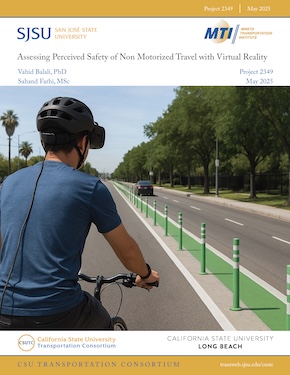- 408-924-7560
- mineta-institute@sjsu.edu
- Donate
Assessing Perceived Safety of Non Motorized Travel with Virtual Reality
Cycling is increasingly advocated as a healthier and more sustainable mode of transportation, as reflected in both scholarly literature and policy initiatives. Nonetheless, the escalation in bicyclist crash fatalities underscores deficiencies in extant roadway designs that inadequately safeguard these vulnerable users. A persistent challenge in the examination of bicyclist safety, behavior, and comfort is the paucity of comprehensive cycling data. To enhance understanding of cyclists' behavioral and physiological responses safely and efficiently, this investigation utilizes a bicycle simulator within an immersive virtual environment (IVE). Off-the-shelf sensors are employed to evaluate cyclists' performance metrics (speed and lane position) and physiological responses (eye tracking and heart rate). Participants navigate a virtual environment scaled to resemble a real-world street with a shared bike lane (sharrows) to evaluate how the introduction of a curbside bike lane and a protected bike lane with flexible delineators affects perceptions of safety, as well as cyclists' behavior and physiological responses. Data collected from 50 participants (across a diverse range of ages and genders) indicate that the protected bike lane design received the highest safety ratings and resulted in the lowest average cycling speed. Both the curbside bike lane and protected bike lane scenarios manifested in more focused gaze patterns than the sharrows scenario, implying that cyclists were more concentrated on the task when biking in designated lanes rather than sharing the roadway with vehicles. Furthermore, heart rate data imply that dedicated bike lanes(curbside or protected) may alleviate cyclists’ stress levels. Female participants exhibited a particular preference for the protected bike lane design.
Vahid Balali
Vahid Balali, PhD, is the principal investigator and an Associate Professor in the Department of Civil Engineering and Construction Engineering Management at California State University,Long Beach (CSULB). Dr. Balali’s research focuses on visual data sensing and analytics, virtual design and construction for civil infrastructure and interoperable system integration, and smart cities in transportation for sustainable decision-making.
Dr. Vahid Balali is a recipient of the 2020 Early Academic Career Excellence Award from CSULB. He was also selected as one of the Top 40 under 40 by the Consulting-Specifying Engineerfor the year 2017 and the top young professional in California by the Engineering News-Record for the year 2016. He received the 2014 second-best poster award from the Construction Research Congress, as well as the 2013 CMAA national capital chapter scholarship award. He is currently an associate member of ASCE and CMAA, a committee member of the ASCE Data Sensing and Analysis and ASCE Visual Information Modeling and Simulation committees, and a friend member of relevant TRB committees. He is also serves as a reviewer of several top journals. He actively collaborates with industrial partners and is involved in professional and outreach activities.
Sahand Fathi
Sahand is pursuing his master's in Construction Engineering and Management at CSULB. He is passionate about exploring innovative technologies and developing solutions for complex spatial problems to enhance the efficiency and safety of construction operations. As a summer intern at Clark Construction, Sahand gained hands-on experience in project management workflows and professional communication. He contributed to several significant projects, helping to streamline processes and optimize operational costs through the application of software development and advanced technological solutions.
-
Contact Us
San José State University One Washington Square, San Jose, CA 95192 Phone: 408-924-7560 Email: mineta-institute@sjsu.edu






